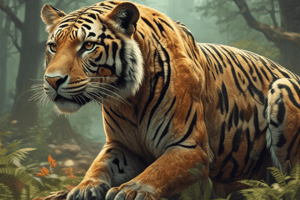Podcast
Questions and Answers
What is the feeding strategy employed by minke whales and blue whales?
What is the feeding strategy employed by minke whales and blue whales?
- Bottom-feeding
- Surface skimming
- Engulfment filter feeding (correct)
- Predatory hunting
Which factor limits the foraging rate of minke whales according to researchers?
Which factor limits the foraging rate of minke whales according to researchers?
- Krill population density
- Predation risk
- Size of the whale (correct)
- Ocean temperature
What is baleen used for by minke whales?
What is baleen used for by minke whales?
- Capturing prey
- Navigating underwater currents
- Breathing underwater
- Filtering out water (correct)
Which characteristic sets minke whales apart from other whales in terms of foraging?
Which characteristic sets minke whales apart from other whales in terms of foraging?
What adaptation allows minke whales to thrive in their aquatic environments?
What adaptation allows minke whales to thrive in their aquatic environments?
In what environment do minke whales and blue whales primarily thrive?
In what environment do minke whales and blue whales primarily thrive?
What is a key feature that distinguishes snakes from their lizard relatives?
What is a key feature that distinguishes snakes from their lizard relatives?
Why are species like honeybees universally harmed by pesticides according to studies?
Why are species like honeybees universally harmed by pesticides according to studies?
What do researchers suggest as a solution to bridge the pesticide risk gap between different species?
What do researchers suggest as a solution to bridge the pesticide risk gap between different species?
What is a common feature observed in the social structures of many species across the animal kingdom?
What is a common feature observed in the social structures of many species across the animal kingdom?
What recent discovery adds evidence to the intelligence and adaptability of octopuses?
What recent discovery adds evidence to the intelligence and adaptability of octopuses?
Why is exploring creatures like giraffe-sized pterosaurs significant according to the text?
Why is exploring creatures like giraffe-sized pterosaurs significant according to the text?
Flashcards are hidden until you start studying
Study Notes
The Animal Kingdom: A Wondrous Realm of Diversity and Evolution
The animal kingdom is a vast realm of diverse creatures that inhabit Earth's varied ecosystems, from the smallest microorganisms to the largest mammals. Spanning the realms of land, air, and water, the animal kingdom showcases the incredible variety and intricate design of life on our planet. This article explores fascinating aspects of the animal kingdom, touching upon subjects like foraging behaviors of marine mammals, the adaptations of species such as snakes, the decline of insect populations, the complex social structures of animals, and the awe-inspiring discoveries that continue to be made about our planet's inhabitants.
Marine Mammals: Foraging and Adaptation
Marine mammals like minke whales and blue whales showcase the incredible adaptations that have allowed them to thrive in their aquatic environments. Minke whales employ a feeding strategy known as engulfment filter feeding, opening their mouths wide to capture as much krill as possible, while filtering out the water using baleen. This behavior is similar to that of their larger relative, the blue whale. Researchers have found that minke whales have higher foraging rates than other whales, leading to the discovery of an important limiting factor: there is a maximum foraging rate that is directly related to the size of the whale.
Snakes: Anatomical Evolution and Fossil Identification
Snakes are a fascinating group of reptiles that exhibit distinct adaptations compared to their lizard relatives. One key feature is the way they shed old teeth from the inside, leaving the tooth base weakened until it breaks away, allowing a new one to erupt. This process has been observed in fossil snake jaws, providing a valuable biomarker for palaeontologists to identify snake fossils, even from fragmented jaw remains. This indicates the importance of studying the fossil record to better understand the evolutionary history of these fascinating creatures.
Insect Populations: Decline and Conservation
The decline of insect populations is a concern for the wider ecosystem, as these creatures play vital roles in pollination and decomposition. Researchers have investigated the factors contributing to this decline, such as the impact of pesticides on bee populations. Studies have shown that species with long foraging ranges, such as honeybees, are universally harmed by pesticides, while short-range foragers like solitary bees and bumblebees have a slightly lower pesticide risk. To bridge the pesticide risk gap between different species, the authors suggest creating semi-natural habitats like wildflower corridors around agricultural fields to provide refuges for beneficial insects.
Social Structures: Dominance and Cooperation
Throughout the animal kingdom, many species exhibit complex social structures, often with one dominant individual at the top and multiple subordinates below them. This pyramidal motif has been observed across hundreds of species, including humans. Research has shown that these hierarchies are more common in pyramids than in other structural arrangements like trees, which have two alpha individuals dominating a third. The study suggests that having an alpha monopolize resources could lead to less conflict among lower-ranking individuals, making pyramids potentially more stable than tree-like structures.
Discoveries and Exploration
From psychedelic toads to extinct pterosaurs, the animal kingdom never ceases to surprise and delight scientists and researchers alike. Recent discoveries include octopuses editing their own RNA molecules, which adds evidence to their intelligence and adaptability, and even hints at potential applications in medical research. Additionally, exploring the lives of creatures such as giraffe-sized pterosaurs helps us better understand our planet's history and the evolutionary processes that shaped its diverse inhabitants.
In conclusion, the animal kingdom offers endless opportunities for exploration and discovery. As we continue to learn about the fascinating behaviors, adaptations, and relationships within this realm, we gain new insights into the intricate balance of life on Earth and the importance of preserving habitats that sustain these incredible creatures.
Studying That Suits You
Use AI to generate personalized quizzes and flashcards to suit your learning preferences.



